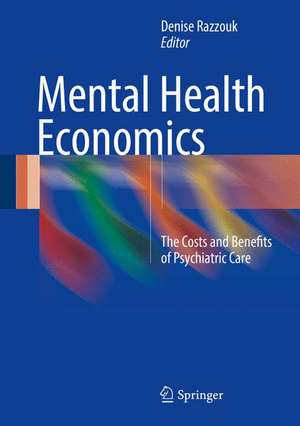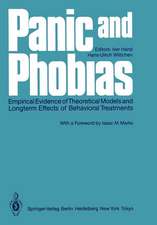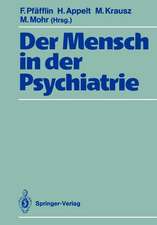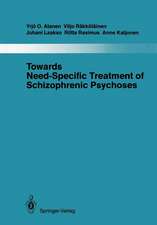Mental Health Economics: The Costs and Benefits of Psychiatric Care
Editat de Denise Razzouken Limba Engleză Hardback – 8 sep 2017
The book is divided in four main topics:
1. Introduction to Health Economics applied to Mental Health – this section is an overview of basic principles, concepts and methods used in Economics and Health Economics to enable students to make critical appraisal of Health Economics texts and also to design research studies in this topic. 2. Health Economics applied to the evaluation of quality and costs of Mental Health Services – this section presents results of Brazilian studies on the costs of mental health care (hospital, outpatient care, residential care, informal care), methods on the measurement of costs and it discusses issues related with public policies decisions and quality of mental health car in the low and middle income countries context. There is also an overview of quality indicators of mental health care and instruments to evaluate mental health services and costs.
3. Health Economics applied to evaluate treatment of mental disorders - This section presents a review of cost-effectiveness of pharmacological treatments and other interventions applied for treating the most burdensome mental disorders such as depressive and anxiety disorders, bipolar disorders, psychosis, alcohol and drug disorders, dementia, and hyper attention deficit disorders.
4. Health Economics, burden and indirect costs of mental disorders - This section highlights the social and economic burden caused by mental illness under societal perspective focusing on stigma, unemployment, indirect costs in the workplace (absenteeism and presenteeism), the relationship between poverty and mental disorders, global health and social determinants of mental health and on the costs of mental disorders (depression, anxiety, psychosis, alcohol and drug disorders). We present some instrumentsto measure indirect costs of mental disorders. | Toate formatele și edițiile | Preț | Express |
|---|---|---|
| Paperback (1) | 677.59 lei 38-44 zile | |
| Springer International Publishing – 10 aug 2018 | 677.59 lei 38-44 zile | |
| Hardback (1) | 1056.75 lei 6-8 săpt. | |
| Springer International Publishing – 8 sep 2017 | 1056.75 lei 6-8 săpt. |
Preț: 1056.75 lei
Preț vechi: 1112.37 lei
-5% Nou
Puncte Express: 1585
Preț estimativ în valută:
202.27€ • 219.79$ • 170.02£
202.27€ • 219.79$ • 170.02£
Carte tipărită la comandă
Livrare economică 22 aprilie-06 mai
Preluare comenzi: 021 569.72.76
Specificații
ISBN-13: 9783319552651
ISBN-10: 3319552651
Pagini: 459
Ilustrații: XXII, 459 p. 32 illus., 18 illus. in color.
Dimensiuni: 178 x 254 mm
Greutate: 1.05 kg
Ediția:1st ed. 2017
Editura: Springer International Publishing
Colecția Springer
Locul publicării:Cham, Switzerland
ISBN-10: 3319552651
Pagini: 459
Ilustrații: XXII, 459 p. 32 illus., 18 illus. in color.
Dimensiuni: 178 x 254 mm
Greutate: 1.05 kg
Ediția:1st ed. 2017
Editura: Springer International Publishing
Colecția Springer
Locul publicării:Cham, Switzerland
Cuprins
Part 1 Introduction Part 1 Introduction of Health Economics Applied to Mental Health.- Chapter 1 Introduction of Mental Health Economics.- Chapter 2 Measurement of Outcomes in Health Economics.- Chapter 3 Methods for Measuring and Estimating Costs.- Chapter 4 Cost-Benefit Analysis.- Chapter 5 Cost-Effectiveness Analysis.- Chapter 6 Cost-Utility Analysis.- Chapter 7 Introduction to Statistics and Modelling Methods Applied in Health Economics.- Chapter 8 Equity and Efficiency.- Chapter 9 Ethics and Values in Welfarism and Extra-Welfarism.- Chapter 10 Health Economics as a Tool for Decision-Making in Mental Health Care.- Part 2 Health Economics Applied to the Evaluation of the Quality and Costs of Mental Health Services.- Chapter 11 Financing Mental Health in Low and Middle Income Countries: Making an Economic Case to Support Investment.- Chapter 12 Quality Indicators for Mental Health Services.- Chapter 13 Economic Data Collection: Instruments for Assessing Costs and Utilization of Health and Non-Health Services.- Chapter 14 Estimation of Costs of Psychiatric Hospitals.- Chapter 15 Estimation of Costs of Community Mental Health Services.- Chapter 16 Estimation Costs or Residential Facilities.- Chapter 17 Quantifying Informal Care for Economic Evaluation in Mental Health.- Part 3 Economic Evaluation of Treatment of Mental Disorders.- Chapter 18 Cost-Effectiveness of Interventions for Anxiety and Depressive Disorders.- Chapter 19 Cost-Effectiveness of Interventions for Bipolar Disorders.- Chapter 20 Cost-Effectiveness of Antipsychotics for the Treatment of Schizophrenia.- Chapter 21 Cost-Effectiveness of Interventions for the Treatment of Alcohol and Drug Disorders.- Chapter 22 Cost-Effectiveness of Interventions for the Treatment of Dementia Disorders.- Chapter 23 Cost-Effectiveness of Interventions for Mental Disorders in Children and Adolescents.- Part 4 Health Economics, Burden and Indirect Costs of Mental Disorders.- Chapter 24 Global Mental Health: Costs, Poverty, Violence and Socio Economic Determinants of Health.- Chapter 25 The Burden and Indirect Costs of Mental Disorders.- Chapter 26 The Burden and Indirect Costs of Alcohol and Drug-Related Problems.- Chapter 27 Economic Impact of Mental Health Stigma.- Chapter 28 The Economic Impact of Mental Disorders and Mental Health Problems in the Workplace.- Chapter 29 Methods and Instruments for the Estimation of Production Changes in Economic evaluation.
Notă biografică
Denise Razzouk is psychiatrist (Universidade de São Paulo - USP, Brazil), with Master in Sciences and PhD in Medicine (Universidade Federal de São Paulo - Unifesp, Brazil), Post-doctoral fellowship in Economics and Mental Health in the Centre of Economic Mental Health (Health Services and Population Research, King´s College, UK), MBA in Health Services Management (Fundação Getulio Vargas, Brazil) and Affiliate Professor in Department of Psychiatry, Unifesp. Founder member and coordinator of the Centre of Economic Mental Health (CESM) in Department of Psychiatry (2009- present) in where she leads research projects in social and economic burden of mental disorders and in evaluating mental health services, interventions and treatments. She has been teaching a course of Economics Mental Health for postgraduate students, and acts as supervisor of Phd, Msc and post-doctoral students. Full Professor for Medical students in Medical College in Universidade Metropolitana de Santos,Brazil (2001-at present). Published 14 book chapters in Psychiatry, organized 1 book in Psychiatry, and has more than 80 papers in indexed journals and in Congress Annals. Dr. Razzouk has been working in collaboration with WHO as a member of the Global Clinical Practice Network, giving consultancy for the Internet-Based Field Studies for ICD-11 Mental and Behavioural Disorders.
Textul de pe ultima copertă
The main objetive of this book is to provide a high quality content that becomes a reference for graduate courses (Mental Health, Public Health and Epidemiology) and for research in the domain of health economics applied to mental health. Also this book might be useful for policymakers on formulating mental health policies. Key messages of this book are based on:
- Mental illness represent a huge cost for society and for health care;
- Health economics applied to mental health could help in the optimization of resource allocation for mental health care and for better decision making in terms of balancing costs and benefits;
- Interventions and treatment should be also chosen in general medical practice and in public decision-policy according to cost-effectiveness, burden of disease and equity principles;
- Quality of care is related with better outcomes, higher quality of life for clients, and with lower costs for society and health system;
- It is possible to decrease the burden of mental disorders with cost-effective treatments.
A growing interest in Health Economics applied in mental health has been noticed, especially because mental disorders have been recognized as very costly to society and health care system. However, the majority of books in this topic are oriented mainly to health managers and not for researchers and mental health professionals. There is a need of increasing capacity-building of researchers in this discipline, especially in terms of methods and measurements, and this book aims to fill this gap.
Mental Health Economics aims to integrate research methods, quality of clinical interventions, evaluation of quality of care and policymaking in terms of balancing costs and benefits.
Caracteristici
A book intended to mental health professionals and researchers Comprehensive perspective of methods, instruments, evaluation and costs in mental health services Cost-effectiveness evaluation of specific interventions and treatments for mental disorders Includes supplementary material: sn.pub/extras




















